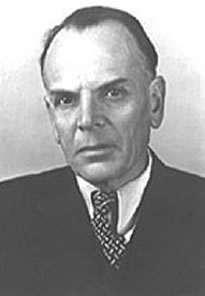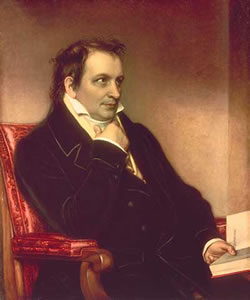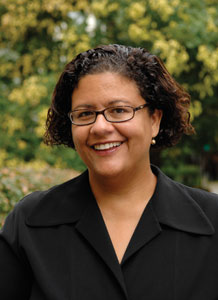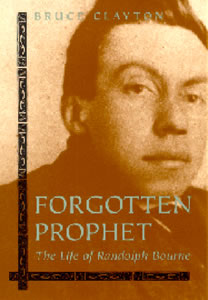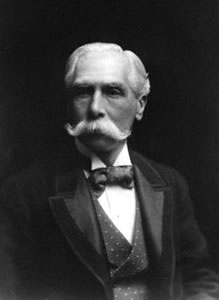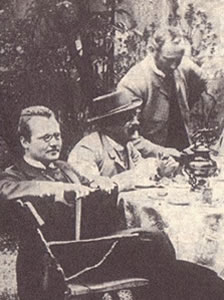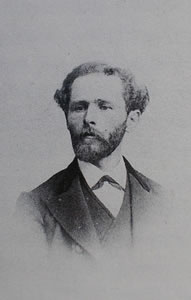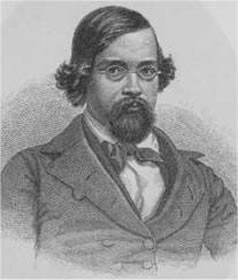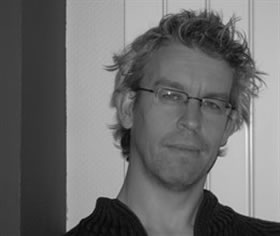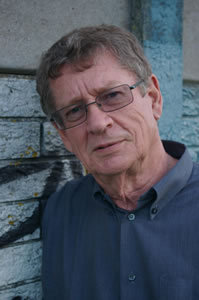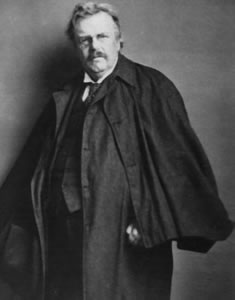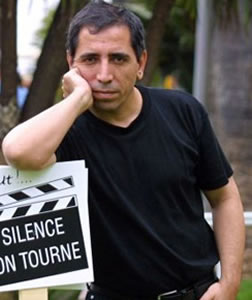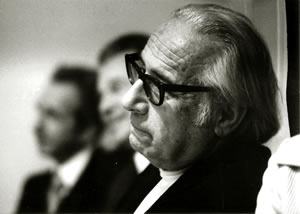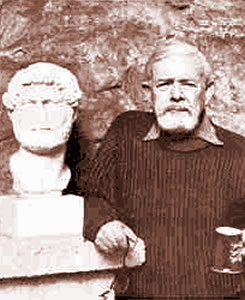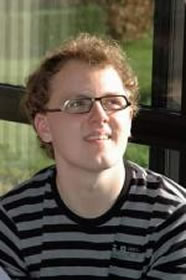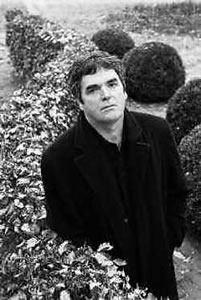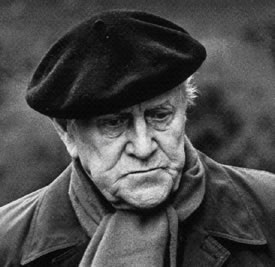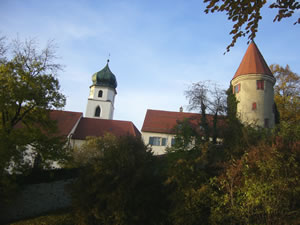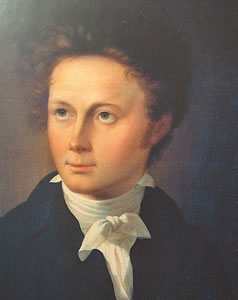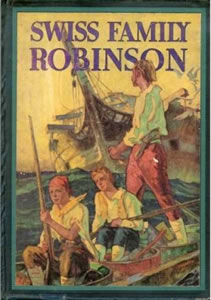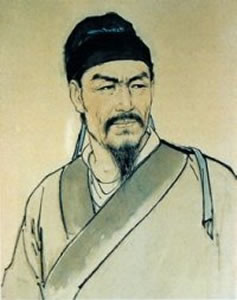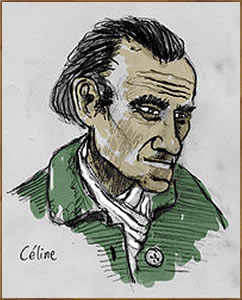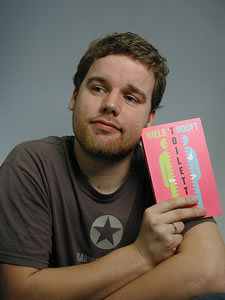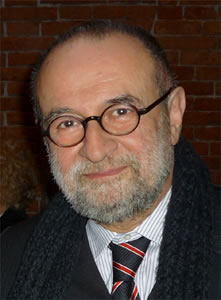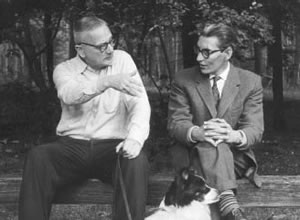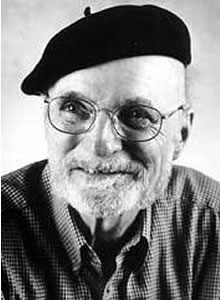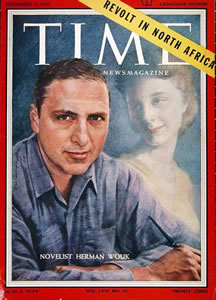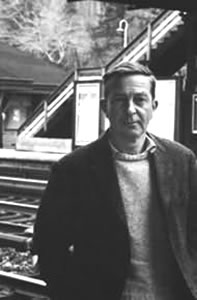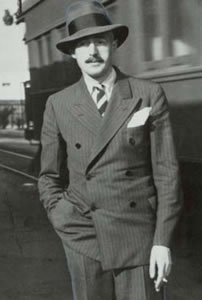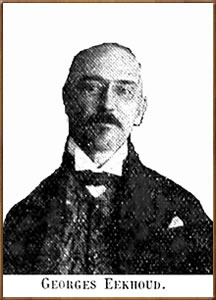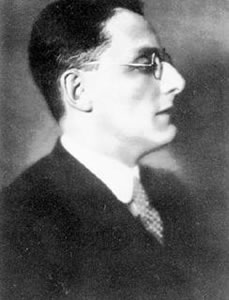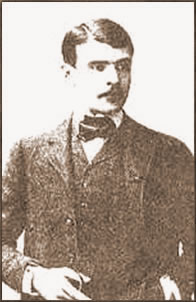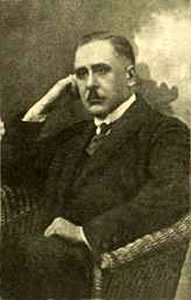De Amerikaanse dichter Walt Whitman werd geboren op 31 mei 1819 in Westhills, Long Island, New York. Zie ook mijn blog van 31 mei 2009 en ook mijn blog van 31 mei 2008 en ook mijn blog van 31 mei 2007 en ook mijn blog van 31 mei 2006
Uit: Calamus Poems
4.
These I, singing in spring, collect for lovers,
(For who but I should understand lovers, and all their sorrow and joy?
And who but I should be the poet of comrades?)
Collecting, I traverse the garden, the world — but soon I pass the gates,
Now along the pond-side — now wading in a little, fearing not the wet,
Now by the post-and-rail fences, where the old stones thrown there, picked from the fields, have accumulated,
Wild-flowers and vines and weeds come up through the stones, and partly cover them — Beyond these I pass,
Far, far in the forest, before I think where I get,
Solitary, smelling the earthly smell, stopping now and then in silence,
Alone I had thought — yet soon a silent troop gathers around me,
Some walk by my side, and some behind, and some embrace my arms or neck,
They, the spirits of friends, dead or alive — thicker they come, a great crowd, and I in the middle,
Collecting, dispensing, singing in spring, there I wander with them,
Plucking something for tokens — something for these, till I hit upon a theme — tossing toward whoever is near me,
Here! lilac, with a branch of pine,
Here, out of my pocket, some moss which I pulled off a live-oak in Florida, as it hung trailing down,
Here, some pinks and laurel leaves, and a handful of sage,
And here what I now draw from the water, wading in the pond-side,
(O here I last saw him that tenderly loves me — and returns again, never to separate from me,
And this, O this shall henceforth be the token of comrades — this calamus-root shall,
Interchange it, youths, with each other! Let none render it back!)
And twigs of maple, and a bunch of wild orange, and chestnut,
And stems of currents, and plum-blows, and the aromatic cedar;
These I, compassed around by a thick cloud of spirits,
Wandering, point to, or touch as I pass, or throw them loosely from me,
Indicating to each one what he shall have — giving something to each,
But what I drew from the water by the pond-side, that I reserve,
I will give of it — but only them that love, as I myself am capable of loving.
7.
Of the terrible question of appearances,
Of the doubts, the uncertainties after all,
That may-be reliance and hope are but speculations after all,
That may-be identity beyond the grave is a beautiful fable only,
May-be the things I perceive — the animals, plants, men, hills, shining and flowing waters,
The skies of day and night — colors, densities, forms — May-be these are, (as doubtless they are,) only apparitions, and the real something has yet to be known,
(How often they dart out of themselves, as if to confound me and mock me!
How often I think neither I know, nor any man knows, aught of them;)
May-be they only seem to me what they are, (as doubtless they indeed but seem,) as from my present point of view — And might prove, (as of course they would,) naught of what they appear, or naught any how, from entirely changed points of view;
To me, these, and the like of these, are curiously answered by my lovers, my dear friends;
When he whom I love travels with me, or sits a long while holding me by the hand,
When the subtle air, the impalpable, the sense that words and reason hold not, surround us and pervade us,
Then I am charged with untold and untellable wisdom — I am silent — I require nothing further,
I cannot answer the question of appearances, or that of identity beyond the grave,
But I walk or sit indifferent — I am satisfied,
He ahold of my hand has completely satisfied me.

Walt Whitman (31 mei 1819 – 26 maart 1893)
Standbeeld in Bear Mountain Park, New York
De Duitse schrijver en cabaretier Frank Goosen werd geboren op 31 mei 1966 in Bochum. Zie ook mijn blog van 31 mei 2007 en ook mijn blog van 31 mei 2008 en ook mijn blog van 31 mei 2009
Uit: Radio Heimat
“An lauen Sommerabenden stehe ich gern auf der Eisenbahnbrücke am Lohring in Bochum und schaue auf meine Stadt. Ich sehe das Mercedes-Hochhaus am Bahnhof, die Fiege-Brauerei, das neue Hochhaus der Stadtwerke (das ein bisschen aussieht wie der Monolith aus ‚2001’), die Türme von Propstei- und Christuskirche, und ganz rechts erkenne ich sogar noch den Förderturm des Bergbau-Museums. Und dann denke ich: Boah! Schön ist das nicht!
Wenn sie nicht im Haushaltskittel daherkamen, trugen diese Frauen Tantenpullover. Unifarbene Strickpullis mit V-Ausschnitt, die sich über einen unglaublichen Atomvorbau spannten. So was wird ja heute gar nicht mehr gebaut. Die Mieder, die das stützen mussten, waren Meisterleistungen der Ingenieursplanung, höchstens noch vergleichbar mit Bauwerken wie der Fehmarn-Sund-Brücke. Diese Pullis saßen so eng, das war praktisch gehäkeltes Neopren. Man fragte sich spontan: Wie kommt die Tante da überhaupt rein? Vermutlich wie der Christbaum ins Netz kommt: Im Altersheim stand auf dem Gang eine durchgeschnittene Tonne, da kam vorne der Pullover drauf, und hinten schoben zwei Zivis. Die alten Männer hörte man oft schon, bevor man sie sah. Ihnen ging ein abgehacktes Donnern voraus, und da wusste man gleich, da kommt wieder einer um die Ecke, der hat dreißig Jahre lang kaum das Sonnenlicht gesehen und hustet jetzt seine schleimigen Lungenreste auf den Bürgersteig hinaus. Und manchmal sah das, was da raus kam, aus, als würde es noch leben. Hackendes Lungendonnern – der Soundtrack einer Kindheit im Ruhrgebiet.“

Frank Goosen (Bochum, 31 mei 1966)
De Oostenrijkse schrijver, toneelspeler en regisseur Gabriel Barylli werd geboren op 31 mei 1957 in Wenen. Zie ook mijn blog van 31 mei 2007 en ook mijn blog van 31 mei 2008 en ook mijn blog van 31 mei 2009
Uit: Echtzeit
„Ich habe dich immer bewundert, wie du das aushalten konntest! Kannst, muss ich sagen. Ich glaube, dass er immer noch Zigarren raucht. Habe ich recht?!
Du kannst es mir ja schreiben. Mit einer E-Mail. Oder anrufen. Oder einfach vorbeischauen und wir reden über den Geschmack von Zigarren auf Männerlippen. Ich bleibe so lange an dem Thema hängen, weil ich unlängst von einem Mann geküsst wurde, der zuvor eine Zigarre geraucht hatte. Eigentlich hat er auch zwischen unseren Küssen weitergeraucht und das fand ich sehr seltsam. Aber du weißt ja, wie Frauen sind. Sie sehen so lange über die Fehler ihrer großen Liebe hinweg, bis sie stören… die Fehler. Und manchmal beendet das eine große Liebe. Ein einzelner Fehler kann da genügen. Nur einer. Dein Stefan hat ja gar keine Fehler. Also fast keine Fehler.
(…)
Deine Seele hat zu mir gesprochen. Damals. In dem Café “Glockenspiel”. Auf dem bordeauxroten Sofa mit der etwas abgewetzten Rückenlehne. Als du mir gesagt hast, dass ich mich zu dir setzten soll. Irgendetwas in mir hat geflüstert: “Vorsicht, Vorsicht, diese Frau sieht aus wie ein Engel… Vorsicht… vielleicht ist sie einer!!” Kleiner Scherz. Aber der Teil in meiner Seele, der gewusst hat, dass ich durch dich viel erleiden werde, um viel zu lernen – dieser Teil hat gesagt: “Los, setz dich zu ihr, schieb das Eis rein und schau dir an, welcher Film da laufen soll.“

Gabriel Barylli (Wenen, 31 mei 1957)
De Duitse dichter en schrijver Gerd Hergen Lübben werd geboren op 31 mei 1937 in Sillenstede. Zie ook mijn blog van 31 mei 2009
VOM ROLANDSYSTEM (Fragment)
5.
einzelteile des
feuersystems roland
nicht kontrolliert werden
sollen zutaten
verzweifelter zeit für
die transatlantischen
paladine
···
wer immer frieden sucht
in niederlagen
siegen die legenden
sagen
comandante
rolando verlies
brain-finish galaxy
sei bei uns der ist auf
einmal auf der flucht
shut up my desert-storm
(···)
alles was aus rolands
sinn verschwunden war in
sein herz wieder heim
bringt und diese treue
hochzeitet mit ihrem
liebsten roland und
ist sein leid zu ende
vergessen vergossen
des morgens drachen
blut durch den bogen fliesst
vom auge gottes aus
tag und nacht zu sehn
und die freude beginnt

Gerd Hergen Lübben (Sillenstede, 31 mei 1937)
De Franse schrijver Serge Brussolo werd geboren op 31 mei 1951 in Parijs. Zie ook mijn blog van 31 mei 2009
Uit: Dortoir Interdit
„Paddy Mulloney avait soixante-dix ans et aimait par-dessus tout se donner des airs d’Irlandais de bande dessinée. Il lui arrivait de s’exhiber avec l’un de ces chapeaux melons verts dont on s’affuble lors du défilé de la Saint Patrick, ou de bretelles ornées de trèfles à quatre feuilles. Il n’avait jamais pu s’acclimater à la Californie ; la pluie lui manquait. A l’agence 13, il avait le grade de chef accessoiriste. En cinquante ans d’immobilier, il avait tout vu. C’était un catalogue ambulant des aberrations humaines. Il dégorgeait les anecdotes comme d’autres les gouttes de sueur pendant une traversée du désert Mojave. A certains moments il me saoulait à tel point que je n’avais d’autre recours que d’utiliser l’autohypnose pour éviter la crise de nerfs. Pour lui, j’étais ” la gosse “, ” la fille “, ” la gamine “, jamais il ne lui serait venu à l’idée d’utiliser mon nom. Pas antipathique au demeurant. Non, un fossile bougon, riant de ses propres plaisanteries, essayant désespérément de me faire rougir en débitant des blagues salées d’un autre âge et qui, aujourd’hui, auraient fait hausser les épaules à une fillette de onze ans. Je ne l’ai jamais vu qu’habillé d’une salopette ; sale les jours de semaine, propre le dimanche.
Tout de même, je l’aimais bien. Peut-être parce que j’ai été privée d’une vraie famille et que je n’ai jamais connu mes grands-parents. Enfin, un psy dirait sûrement ce genre de truc puisque ça ne mange pas de pain.
Mais la jovialité de Paddy s’éteignait dès qu’il s’agissait de se rendre au magasin d’accessoires. Là, d’un coup, son visage s’assombrissait et il ne desserrait plus les dents de tout le voyage. Devereaux me l’avait collé dans les pattes dès mon contrat d’embauche signé.
— Mulloney vous fera visiter nos installations, m’avait-il expliqué. Nous disposons d’un matériel de récupération étonnant, dont vous saurez tirer parti. Il ne s’agit pas de vulgaire brocante, mais de pièces de mobilier que nous ont abandonnées les propriétaires des appartements dont je vous ai parlés. Certaines sont de grandes valeur, mais nécessitent des restaurations. Vous estimerez cela sur place. Dressez un catalogue et voyez ce vous pouvez réutiliser.“

Serge Brussolo (Parijs, 31 mei 1951)
Zie voor nog meer schrijvers van de 31e mei ook mijn vorige blog van vandaag.

